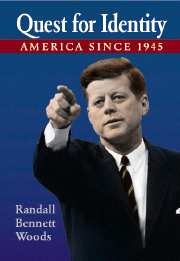Book contents
- Frontmatter
- Contents
- Preface
- 1 The Republic in Transition
- 2 The Origins of the Cold War
- 3 Staying the Course
- 4 Containing Communism and Managing the Military–Industrial Complex
- 5 Capitalism and Conformity
- 6 Liberalism Reborn
- 7 The Wages of Globalism
- 8 The Dividing of America
- 9 Realpolitik or Imperialism? Nixon, Kissinger, and American Foreign Policy
- 10 The Limits of Expediency
- 11 From Confidence to Anxiety
- 12 Governing in a Malaise
- 13 The Culture of Narcissism
- 14 In Search of Balance
- Index
4 - Containing Communism and Managing the Military–Industrial Complex
The Eisenhower Administration and the Cold War
Published online by Cambridge University Press: 05 June 2012
- Frontmatter
- Contents
- Preface
- 1 The Republic in Transition
- 2 The Origins of the Cold War
- 3 Staying the Course
- 4 Containing Communism and Managing the Military–Industrial Complex
- 5 Capitalism and Conformity
- 6 Liberalism Reborn
- 7 The Wages of Globalism
- 8 The Dividing of America
- 9 Realpolitik or Imperialism? Nixon, Kissinger, and American Foreign Policy
- 10 The Limits of Expediency
- 11 From Confidence to Anxiety
- 12 Governing in a Malaise
- 13 The Culture of Narcissism
- 14 In Search of Balance
- Index
Summary
Shortly before he left office after serving two full terms as president of the United States, Dwight Eisenhower delivered one of the most notable farewell addresses in American history. On the eve of his departure, the general turned president looked back over the first 15 years of the Cold War with mixed feelings. Communism had been contained without a war between the world's nuclear superpowers. But there had been a price – the gradual conversion of the United States into a garrison state. The joining of a huge military establishment with a mushrooming arms industry was unique in the American experience, he observed to his countrymen. “The total influence – economic, political, even spiritual – is felt in every city, every State house, every office of the Federal government.” Eisenhower then issued a dire warning: “In the councils of government, we must guard against the acquisition of unwarranted influence, whether sought or unsought, by the military–industrial complex. The potential for the disastrous rise of misplaced power exists and will persist.” The story of the Eisenhower administration's foreign and defense policies was the struggle, on the one hand, to contain communist aggression and subversion, and on the other hand, to limit the power of the business–labor–academic coalition that had become dependent on that very struggle.
In foreign affairs, Dwight Eisenhower was not fundamentally unhappy with the course of American policy since 1945. As NATO's first commander-in-chief, he had been a loyal advocate of Truman's containment policy.
- Type
- Chapter
- Information
- Quest for IdentityAmerica since 1945, pp. 99 - 120Publisher: Cambridge University PressPrint publication year: 2005



